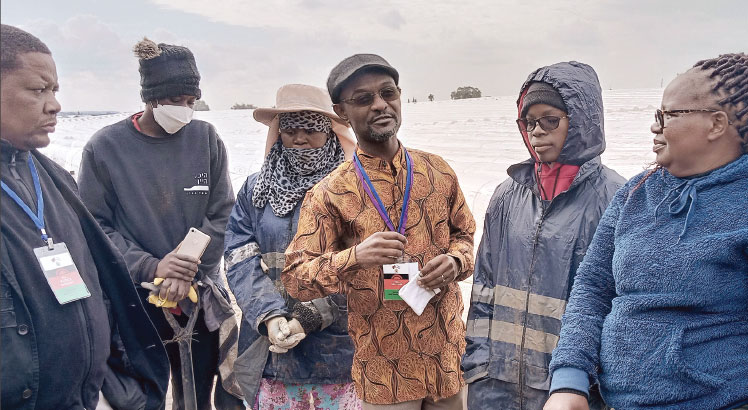At least 23 Malawians who went to Israel to work in Farms have escaped from the farms and are seeking asylum in the country, a situation that is worrying authorities in that country who say the move can jeopardise future opportunities.
At this point, lets explain the asylum seeking concept so we are all on the same page. According to Amnesty, an asylum seeker is a person who has left their country and is seeking protection from persecution and serious human rights violations in another country, but who hasn’t yet been legally recognized as a refugee and is waiting to receive a decision on their asylum claim. Seeking asylum is a human right. This means everyone should be allowed to enter another country to seek asylum.
Malawi’s Honorary Consul in Tel Aviv, Israel, Nir Gess said the 23 have left in the last two months either to seek employment elsewhere or asylum on the pretext that Malawi was not safe for their settlement.
“This worries Israeli authorities, who are wondering whether they can trust Malawians or not,” he said.
This complaint came after Israel’s Minister of Economy Nir Barakt announced that Malawi has an opportunity to send up to 100 000 employees with 10 000 expected within two months.
During a meeting with the Malawi delegation on Wednesday, Israeli Population and Immigration Authority director-general Eyal Sisso said the development was worrying and urged Malawian authorities to help instil discipline among the workers.
He said while Israel generally appreciated Malawi’s warm gesture to send workers during a difficult time, the conduct of the few individuals may potentially affect opportunities for many.
Said Sisso: “We are really happy to see Malawians coming to work in Israel and from our part, we will do everything to support them. Most employers are happy with the hard working spirit of these workers, but we need to ensure that they follow the contract.”
He said Israeli authorities know the whereabouts of the escapees, but cannot pounce on them because the law requires that anyone seeking asylum should be accorded opportunity to be heard through a court process which takes time.
Sisso added that he knows the situation in Malawi does not warrant anyone to seek asylum as the country is generally peaceful and stable, as such, it is foolhardy for anyone to think they can use their farm visa for other employment.
Responding to Sisso’s concerns, Secretary to the Treasury Betchani Tchereni, who is leading the Malawi delegation, said it is regrettable that some Malawians are running away from farms.
Adding that this was equally a concern of Malawi and because the workers have obligations to meet. He assured Sisso that Malawians are generally disciplined people and that the few bad apples should not soil the country’s name.
Tchereni said government will ensure that due diligence is done on who gets this opportunity to avoid disappointment.
He said: “We are very thankful that we have been given this opportunity. We are committed as a government to ensure that this works to our advantage and indeed we will ensure that we have strict measures that will ensure that our people follow the contract and laws of this country.”
Tchereni said this was also the reason Malawi wants a government-to-government agreement signed as soon as possible to ensure full involvement in the selection process of the workers. Currently, private recruitment agencies are in the forefront of the programme.
Speaking to the Malawi delegation yesterday, a farmer who owns Noyman Eggplant Limited, identified as Jacob, said he is frustrated with the conduct of Malawian workers after one of the 12 ran away in less than a month.
His farm had 50 workers, including 12 Malawians.
He said he has resolved not to hire Malawians anymore.
Said Jacob: “I have employees from Thailand who have worked in this farm for more than 20 years without running away. But this lady from your country ran away. I do not want to be in a situation where I wake up in the morning and one worker is out.
“It is not good for business. I pay them $2 000 per month and sometimes more than that depending on the number of hours. I feed them well just like my children. Why running away?”
Tchereni and members of Parliament (MPs) in the delegation took turns to plead with him to keep employing Malawians, saying the team was in Israel to resolve such issues.
Parliamentary Committee on Public Appointments chairperson Joyce Chitsulo said that more Malawians are willing to work in Israel and that as representatives of the people, they will ensure that the selection process is more diligent so that only those capable of working are included in the programme.
Tchereni and the MPs further encouraged Malawian workers to respect contractual obligations to their benefit and the nation.
He said they need to appreciate the fact that their salaries were way above some executives in Malawi and this should be a huge incentive to work hard.
Thyolo Central MP Ben Phiri, who is chairperson for Sadc Parliamentary Committee on Population, appealed to the workers to appreciate the fact that they are privileged to work here.
“Life in Malawi is extremely unbearable. Most of you had nothing to do back home but here you want to squander a golden opportunity? Come on, don’t be bad ambassadors to others willing to work here,” he said.
A representative of the workers at the farm, Kondwani Gondwe, said most of the problems have come about due to lack of government involvement in the labour export arrangement.
She said while their conditions were much better, others worked under harsh conditions and got low wages.
Gondwe, who holds a degree in nutrition and food science from Lilongwe University of Agriculture and Natural Resources (Luanar) as well as diploma in food, nutrition and livelihood security from NRC and a diploma in cross-border agriculture, appealed to government to put in place mechanisms that would allow them raise concerns directly to them.
Similar sentiments were also expressed by other workers at the farm, the only concern being sanitation as they said over 10 people use one bathroom and toilet.
In their assessment, the MPs observed that poor selection process of the workers is leading to some of them running away from farms.













